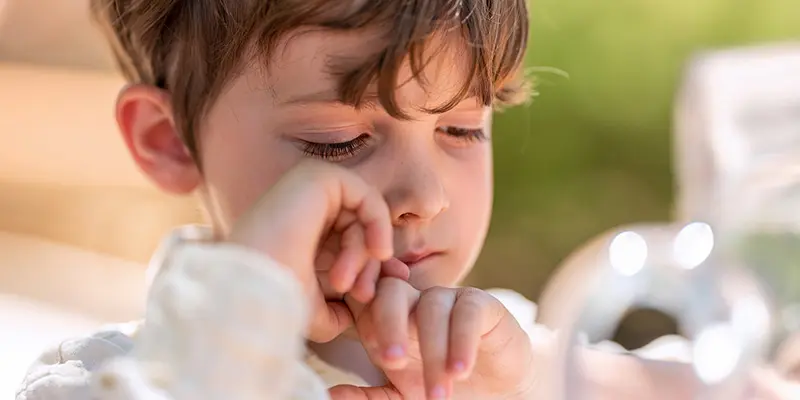
Children and teens in the U.S. are struggling with mental health disorders more than ever before—and they are not getting the help they need. Before the pandemic, data from the Centers for Disease Control and Prevention, indicated nearly 1 in 5 children in the U.S. suffer from mental health disorders, yet only about 20% of those children receive care from a mental health provider.
Estimates from the U.S. Surgeon General indicate most children struggling with mental disorders do not receive treatment, even in cases of well-recognized conditions like attention deficit hyperactivity disorder (ADHD), sometimes referred to as attention deficit disorder (ADD). Late last year, amidst the added stressors of the pandemic, the U.S. Surgeon General issued an advisory claiming a mental health crisis amongst youths. Indeed, one published analysis found depressive and anxiety symptoms in kids doubled to 25.2% and 20.5%, respectively.
Nearly 1 in 5 children in the U.S. suffer from mental health disorders, yet only about 20% of those children receive care from a mental health provider. Click To TweetPrimary care doctors only catch the signs of a psychiatric issue about 25% of the time—and that usually results from a parent alerting them to a potential problem, according to one study. It underscores the critical role a parent can play in getting their child properly diagnosed and treated for mental health conditions.
DIFFICULTY RECOGNIZING SIGNS OF MENTAL HEALTH ISSUES IN KIDS
It can be difficult for a parent to recognize a potential mental health issue in their child or teen. Research shows this to be true. The implications of treating a potential psychiatric problem—such as finding the right help and dedicating financial resources—and the existing stigma surrounding mental health issues can factor into a parent’s inability to see the signs and take action.
A general lack of knowledge and understanding about the signs of mental health disorders is another major reason why so many mental health issues go undetected and untreated, according to a 2021 study.
This can be especially true for struggling teens, who are expected to rebel, make poor decisions, act impulsively, be prone to moodiness, and keep their inner lives hidden from adults. A parent may write off certain signals of mental health distress as simply “teen” behavior.
However, an educated parent can tell the difference and take action. If you are a parent of a child or teen, here are the warning signs that tell you it’s time for your child to have a psychiatric evaluation.
SIGNS AND SYMPTOMS OF MENTAL ILLNESS IN KIDS AND TEENS
Let’s first look at the signs of more severe cases of psychiatric illness. About a decade ago, officials from the National Institute of Mental Health (NIMH) and the Center for Mental Health Services tasked a group of highly skilled child mental health epidemiologists, parent/advocacy representatives, and policy experts from top research institutions such as the Mayo Clinic, Duke University, Harvard Medical School, and others to determine simple, easily understood, scientifically derived warning signs of mental health issues in children specifically for parents, teachers, school counselors, and lay people.
They analyzed epidemiological data from more than 6,000 children and parents and sought to identify symptoms of severe but mostly untreated mental health problems. They came up with the following 11 warning signs, which was published in the medical journal Pediatrics. Keep in mind that these warning signs are differentiated from other problematic behavior when the behavior persists over time, impacts a child’s functioning, or affects other people.
11 WARNING SIGNS YOUR CHILD MAY NEED A PSYCHIATRIC EVALUATION
- Feeling extremely sad or withdrawn for greater than 2 weeks
- Having made or making serious plans to harm or kill themselves
- Sudden, overwhelming fear not tied to any particular reason sometimes experienced with a racing heart or fast breathing
- Getting involved in multiple fights; using a weapon, or strongly desiring to hurt others
- Severe, out-of-control behavior that can endanger themselves or others
- Not eating, throwing up, or taking laxatives to make themselves shed weight
- Intense worries or fears that get in the way of their day-to-day activities
- Immense difficulty in concentrating or remaining still that puts them in physical danger or causes school failure
- Repeated use of drugs or alcohol
- Strong mood swings that cause problems in relationships with others
- Dramatic changes in their behavior or personality
If you observe just one of these behaviors in your child or teen, it is recommended that you take them to see a qualified mental health professional for an evaluation.
MORE TIPS FOR RECOGNIZING THE NEED FOR MENTAL HEALTH SUPPORT IN KIDS
In addition to the warning signs noted in the meta-analysis above, the NIMH also provides a general list of more nuanced symptoms/signs for parents to look for, which are specific to a child’s age.
Again, remember that some behavioral problems may come and go, but when there’s likely a mental health issue the signs and symptoms last weeks or months. If you notice that any of the signs interfere with your child’s daily life at home and at school, or with friends, it’s time to contact a mental health professional.
SIGNS A YOUNG CHILD MAY NEED A PSYCHIATRIC EVALUATION
- Has frequent tantrums or is intensely irritable most of the time
- Complains of stomachaches or headaches with no known medical cause
- Struggles to be still except when watching videos or playing videogames
- Sleeps too little or too much, often has nightmares, or appears sleepy during the day
- Not interested in playing with other children or has difficulty making friends
- Has trouble academically or has experienced a recent decline in grades
- Repeats actions or checks things repeatedly out of fear that something bad may happen.
SIGNS AN OLDER CHILD OR TEEN MAY NEED A PSYCHIATRIC EVALUATION
- Shows little interest in things that they used to enjoy
- Exhibits low energy
- Sleeps too much or too little, or seems sleepy throughout the day
- Spends more and more time alone, and avoids social activities with friends or family
- Exhibits periods of highly elevated energy and activity, and requires much less sleep than usual
- Says they think someone is trying to control their mind or that they hear things others don’t.
These are not the only signs of a mental health issue, but they are the most studied and common. Remember that no one knows your child as you do. Do not discount your own “gut” feelings when something is amiss.
PRIORITIZE YOUR CHILD’S MENTAL HEALTH
The National Alliance on Mental Illness (NAMI) recommends that parents start early with regular emotional “check-ins” with children to ensure better mental health. They suggest making a safe space for your child to share openly without fear of retaliation. Listen and validate your child’s experiences. It’s important for them to feel you are eager to hear about their life in a supportive, non-judgmental way.
Starting this practice early in life teaches your child the language of emotional expression and makes it much more likely that they will open up when they are struggling mentally.
Mental health issues in a child or teen can’t wait. At Amen Clinics, we’re here for you. We offer in-clinic brain scanning and appointments, as well as mental telehealth, clinical evaluations, and therapy for adults, teens, children, and couples. Find out more by speaking to a specialist today at 888-288-9834 or visit our contact page here.





There are not nearly enough therapists to deal with children who have already been diagnosed with mental health issues. And many, if not most, therapists are not trained to deal with the issues being faced by children and their parents these days.
Comment by SuzieQue — January 30, 2023 @ 5:58 AM
Have you ever thought about the fact that how your brain processes what is heard and seen contributes to your mental health? In children, headaches and shifts in behaviors occur when there are unknown visual processing difficulties making it difficult to keep print clear and single. Yes, unknown. A child's norm is rarely shared with others. Sound intolerance contributes to difficulties listening with comprehension and remembering. Sound intolerance triggers anxiety, fight and flight emotions. These constant stressors affect brain chemistry, mental health. Blogs, booklets, activities, and videos are available at MooreAuditoryTraining.com
Comment by Cheri Moore — January 30, 2023 @ 8:13 AM
My parents would have never noticed my symptoms. I had to get 74 yo and notice my own symptoms. My symptoms today are that I attract one toxic person after the other.
Comment by Ellen Steens — January 30, 2023 @ 9:52 AM
Can a three year old have a mental health problem in a emotionally abusive situation with one parent?
Comment by Brenda — January 30, 2023 @ 4:55 PM
What about diet influence? So many kids get so little nutrition. I recognize you are responding to extremes but diet can be so effective .
Comment by Heather B — January 30, 2023 @ 6:50 PM
I'm a court appointed advocate for children in foster care. My present case started 6 years ago with a mother killing the 1 year old baby with siblings present. The 2 younger ones are doing better than the 2 older ones that tried to save the baby many times before the final incident. They suffer greatly and there is not really a good place in my state, that I know of, to get them the help they need. The younger 2 children have forever homes and starting to thrive. I want to save the older 2 and have done about everything I can think of to do that. They need the best therapy possible and I want to see that they get it, but it's all uphill. This article is about them!
Comment by Billie Knittig — January 31, 2023 @ 8:27 AM